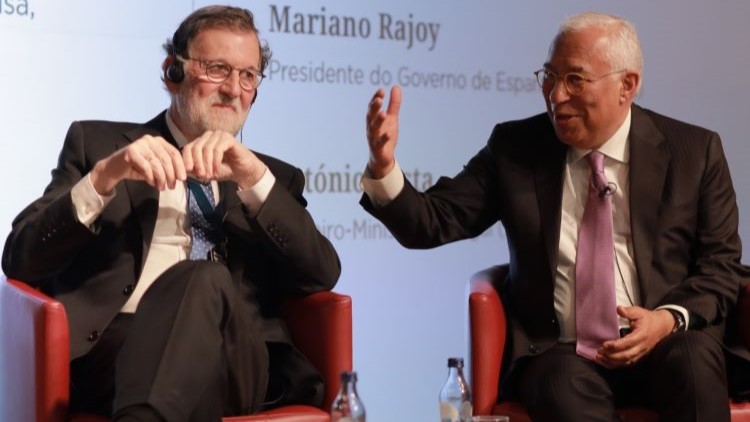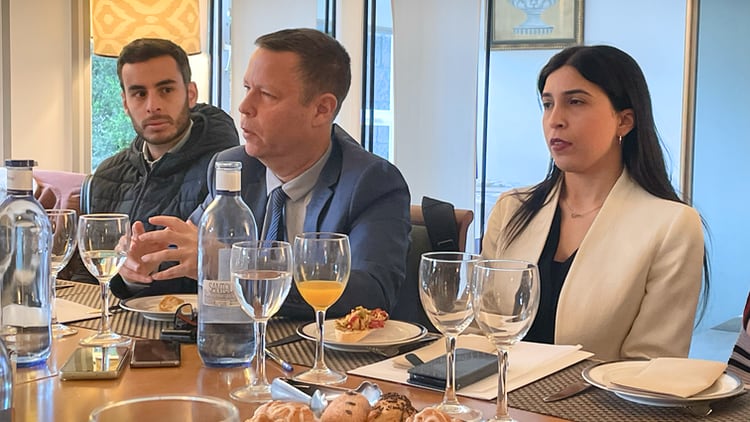Eduardo González
The defense of democracy against serious threats, such as populism or war in Europe, featured yesterday in the second edition of the La Toja-Vínculo Atlántico Forum, which took place at the Calouste Gulbenkian Foundation in Lisbon and coincided with the 50th anniversary of the April 25 Revolution in Portugal and with the upcoming commemoration of the fiftieth anniversary of the beginning of the democratic transition in Spain.
The La Toja Forum – Vínculo Atlántico was born five years ago in Galicia as a civil society initiative to promote reflection and conversation. The first ordinary edition was held in 2019. To date, the Forum has had the participation of prominent political leaders, such as Marcelo Rebelo de Sousa, António Costa, Pedro Sánchez, Mariano Rajoy, Enrico Letta, Mauricio Macri or Felipe González, as well as intellectuals of the stature of Steven Pinker, Timothy Garton Ash or Ivan Krastev.
Spain and Portugal “are united in democracy, freedom and pluralism, but aware of the common challenges they face,” said the President of Portugal, Marcelo Rebelo de Sousa, during the opening ceremony. Among those challenges, he warned, are “inequalities, populism, inorganic movements and war in Europe.” Therefore, after these “50 years of lived and unfinished democracy,” the president expressed his hope that “the next 50 years can also make our descendants proud.”
For his part, the Portuguese Minister of Foreign Affairs, Paulo Rangel, stated that Portugal and Spain must converge in relations with Latin and Central America. “The Atlantic objective of the European Union involves a permanent and integrated relationship with Mercosur” and, for this, the integrated action of the two Iberian countries is “crucial.” He also pointed out three issues that are “absolutely decisive for both countries” and that will mark the bilateral relationship: “Climate change, water and energy.”
Representing the Spanish Government, the Minister of Defense, Margarita Robles, paid tribute to “all those people who have contributed to having a regulatory framework that allows us to grow and look to the future”, with special mention to one of the promoters of the La Toja Forum, the late former minister Josep Piqué, and warned that “we must take care of democracy and its values, every day, because only in a world where there is respect, coexistence and tolerance can progress be made.” “From Europe we have to support Ukraine more than ever, not only for its territorial integrity, but also because this means defending democracy and human rights,” she added.
In the third and final round table, the former president of the Government Felipe González warned against the rise of populism and gave Portugal as an example when it comes to “preserving the space in which the future of democracy is played, which is the space from the center”. In his opinion, the problem is not the lack of agreement between the political forces “that have to antagonize, offering alternatives”, but the need to “avoid dependence on radical groups in any direction, which condition the well-being of centrist politics.”
For his part, the former Prime Minister Mariano Rajoy also warned against two enemies of current democracies: “One is in the world, which believed, after the fall of the Berlin Wall, that democracy had been definitively established, which is not TRUE. The other is at home: it is populism, which is a very varied thing.” “The populist can be a xenophobe from old Eastern Europe, a Spaniard fascinated by tropical dictatorships or a millionaire from New York,” he added. The best way for liberal democracies to combat populism, he added, is “better governance and a strong economy.”
Two former Portuguese prime ministers, António Costa and Francisco Pinto Balsemão, spoke at the same round table, the first of whom warned that “the feeling of lack of future is one of the things that most fuels populism.” In any case, Costa wanted to downplay the growth of the extreme right in Portugal in the last legislative elections: “We must not overestimate the importance of the last elections, which took place under strange conditions.” Therefore, he continued, “there is no point in exaggerating the interpretation of these results” and it is preferable to “give time for things to return to normal.”
For his part, the Spanish ambassador to Portugal, Juan Fernández Trigo, congratulated Portugal “for the changes and for the 50 years of democracy, a serene democracy that has changed the destiny of the Portuguese.”






